3 Year Survivor
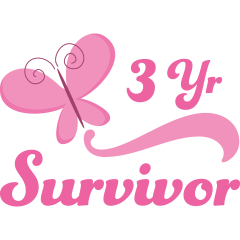
3 Year Survivor
3 Year Survivor
Yes, I am now officially a 3 year survivor! February 5, 2016, a day that will forever be etched in my memory. It was merely 3 years ago that my life changed with the dreaded diagnosis of stage 2b invasive ductal carcinoma. Breast Cancer, I thought…could this be right? Surely they have the wrong person. Could this really be happening to me?
Why 3 Year Survivorship Is Important
For me, every year that I am cancer free is a blessing. Researchers based breast cancer survival rate on 5 year survivorship. Statistics show that 5 year survivor rate of someone diagnosed with stage 2 breast cancer is 93%. So for me being a 3 year survivor brings me that much closer to the 5 year mark. And being this close gives me continued hope.
How Breast Cancer Changed Me
The diagnosis of breast cancer alone is scary for anyone. The diagnosis in itself changes the history and potential path of your health. But more than that, it changes your perspective, which in turns changes your priorities and focus. Having been diagnosed with breast cancer is one thing. Going through chemotherapy, radiation, AND multiple surgeries is a whole other ball game. Treatment for breast cancer is what really tests your inner strength. It is a test that will takes you to the edge of your breaking point. 3 years later, I made it. I am a 3 year survivor.
Not only did I make it, but it made me a stronger person in many ways. It made me appreciate the little things like sleeping on my stomach and dressing myself. Likewise, it also helped me not sweat the small stuff. My children don’t have to wear matching socks, and they can stay up late every now and then.
Life is short, enjoy every moment of it, for tomorrow is not promised.
- Published in breast cancer, Uncategorized
Breast Reconstruction
Breast Reconstruction
Breast reconstruction after a mastectomy can be seen by many as optional. Some women opt to not go through the reconstruction process for a number of good reasons.
For me, like many women, I chose the reconstruction process as a way to become whole, physically. Or at least close to it. Make no mistake, the decision to start the process was not taken lightly. As a matter of fact, I waited one year after my mastectomy to even start the process. Some of the wait time was due to allowing my body time to heal. But much of it was time to allow my mental and emotional being to heal. I wanted to enjoy vacations again. To enjoy sleeping in any position, and even enjoy having less doctor’s appointments for a while. I wanted freedom from dressing changes, as well as freedom from drainage tubes. Having my prosthesis at that time, gave me just that. The prosthesis also gave me the look of being symmetrical.
Breast Reconstruction Options
There are many options for breast reconstruction following a mastectomy. Your option may vary depending on your treatment, such as radiation. It can depend on your mastectomy technique, or even the expertise of surgeons in your area. The two main types of reconstruction options following a mastectomy are implants, or breast flap. A breast flap is essentially the use of your own tissue and blood vessel transplanted to create your breast. Breast flaps are performed by plastic surgeons who specialize in micro surgery. There are several donor sites for breast flaps.
Reconstruction Decision
Due to the extensive tissue damage from radiation, breast reconstruction has truly been a journey. Initially my plan was to undergo one of the breast flap procedures. After meeting with three excellent plastic surgeons, I opted for the less invasive procedure of having an implant. Initially I didn’t consider having an implant due to the higher failure rate following radiation. After discussing different techniques with the plastic surgeons, we agreed that an implant could be successful in my case.
Reconstruction Process
To help ensure success, prior to having the implant placed, I underwent fat grafting. This was to help add healthy tissue to surrounding implant area. During my second surgery I had the actual implant placed. At the same time, I had a breast reduction of my healthy breast. My third surgery was to create my nipple. Yes, I had three surgeries over a 12 month period! And guess what? I still have one more to go. My plastic surgeon and I are taking it very slow allowing me to fully heal after each phase. Though it sounds like lots of surgeries and recoveries, they have all been outpatient (no overnight hospital stay) surgeries, requiring me to be out of work for one week or less.
As mentioned before, reconstruction has been an attempt to become whole again. And to help erase those physical reminders of cancer. In the end your reconstructed breast may never be the same as the ones you had before, but who cares, those ones tried to kill you anyway!
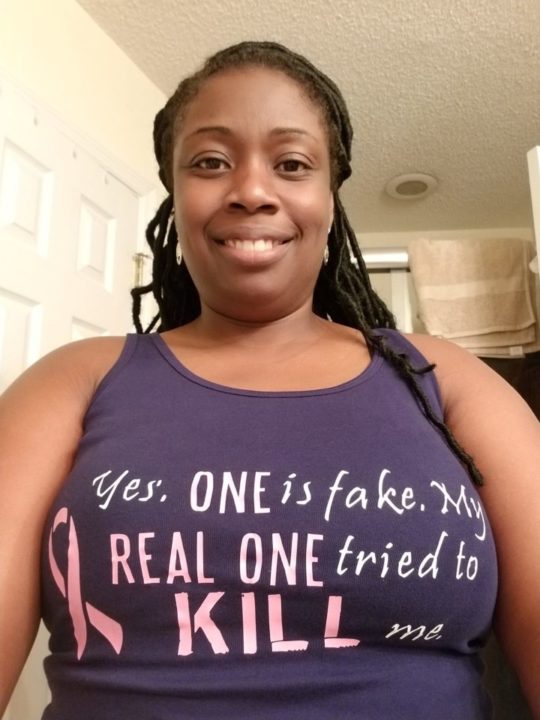
Reconstruction
I have often been asked what to buy someone going through breast surgery and Tender Tanks, by far tops my list. A dear friend of mine bought one for me prior to my mastectomy two years ago. It was convenient that I purchased a second tank. To this day I still wear a tank when I visit my oncologist or plastic surgeon. It beats wearing a paper gown any day!
- Published in breast cancer, Reconstruction, surgery
Hope | When There Is Nothing Else
Hope
Hope is the desire for a certain thing to happen. A feeling of expectation. When there is nothing else, hope may be all you have. On the breast cancer journey, you are faced with a roller coaster of feelings and emotions. Many doctors, even more appointments, good news as well as bad news.
Often times through the ups and downs, you will feel all alone. Alone with nothing but your thoughts and mere HOPE.
What Do You Hope For?
For better news
That this is some mistake
For shorter treatment regimen
For the chemo and radiation to work
That your hair will not fall out
That your hair will grow back
For the side effects to end
To get back to a normal life (or at least your new normal)
To be cured of cancer
Throughout my journey, I had HOPE that all these things would come to pass. Likewise, some people have hope in their doctors, in their families, or even their significant others. For me, my hope was most evident in the middle of the night and the wee hours of the mornings, when the tears always threatened to fall, and eventually got their way. During the day, it was game face on, and no time to stop and think. At night, I was alone with just my thoughts. At least that’s how I felt and thought. Those were actually the moments when my greatest source of hope was with me. Just me and God!
Don’t Give Up
There are many reasons why people give up hope. It may be due to their circumstances and situation. It may also be due to the fatigue of treatment, which is both mental and physical. When you feel like you are losing hope just remember IICorinthians 4:17-18.
Believe me I know first hand that “momentary” actually seems to last a lifetime. Regardless, keep pushing.
What is your hope anchored in? A cure, a medication, your physician, surgery, etc.
I have wanted a tattoo, and for many months I contemplated what I could possibly want permanently affixed to my body. Something that would never change. Near the end of my chemo regimen it came to me.
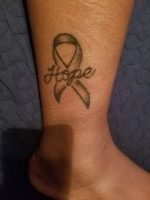
Hope Tattoo
Remembering The Journey
My journey will never be forgotten. How could it? But most importantly this tattoo is a reminder of the times when all the chips were down, and I felt like there was no end it sight. When no one understood. Hope got me through. I also found hope and encouragement through reading this book, When God And Cancer Meet.
- Published in breast cancer, Support, Uncategorized
CanCare | Providing Emotional Support
CanCare
My husband and I had the very fortunate opportunity to become volunteers with an organization called CanCare in March of 2018.
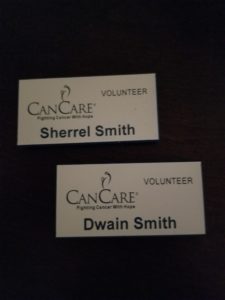
CanCare Volunteers
What Is It?
CanCare is a non-profit cancer support service. The mission is to improve the quality of life for cancer survivors and their families.
CanCare was first started in Houston, Texas. The organization now has over 600 trained volunteers. Many of these volunteers have survived cancer. The volunteers are matched with clients who are experiencing the same or a very similar cancer. Clients are also matched to volunteers based on other criteria such as; location, similar treatment, age, and gender. The volunteers represent more than 75 different cancer types.
CanCare volunteers provide one on one emotional support. This support can be by phone, text, email or in person. This support may also be once or may develop into an ongoing relationship. This is totally dependent on the client.
Caregivers
A very important part of going though the journey of cancer is the ongoing support and help of caregivers. Caregivers are often those loved ones or family members, such as a spouse, child or parent. Likewise, caregivers can also be close friends or other relatives. However, in any event caregivers need support as well. Your cancer journey can be just as difficult and emotional for your caregiver. CanCare is here to help.
Emotional Support
Unfortunately for my husband and I, we did not learn about CanCare during OUR journey. Once we learned of the organization we immediately knew we wanted to give back in this way. We wanted to help other families get through the journey by being that listening ear and glimmer of hope. As volunteers, we know how beneficial it would have been to have someone support us during this journey. Make no mistake we had the support of our family during such a tough time. In light of that, what was missing was the support of someone who had actually been on our same journey firsthand.
Like myself, my husband was not interested in support groups. We did not want to sit in the room of other like ourselves comparing stories. Nonetheless, many people find that support groups meets their need. On the contrary, CanCare is different since it provides one on one support
Get Involved
Through CanCare, my husband and I are now blessed to be able to support five people, to date, on their journeys.
CanCare is a self referral program, therefore if you or someone you know has been diagnosed with any type of cancer, please encourage them to reach out to CanCare. Likewise, if you know someone who is a caregiver to someone diagnosed this cancer, encourage them to reach out to CanCare as well. Emotional support goes a long way and can often help survivors and caregivers get through the physical challenges a little better.
- Published in breast cancer, Support, Uncategorized
Race For The Cure
Race For The Cure
On September 22, 2018 the annual Susan G. Komen Race For The Cure, was held in Charleston, South Carolina. The Race For The Cure is held annually in support of breast cancer awareness, research, education, and advocacy. The race itself is actually a series of 5K runs and walks. The Race For The Cure is an opportunity to show your support of family and friends who have been diagnosed with breast cancer. In addition to showing support, it is also a good way to learn more about the disease, above all.
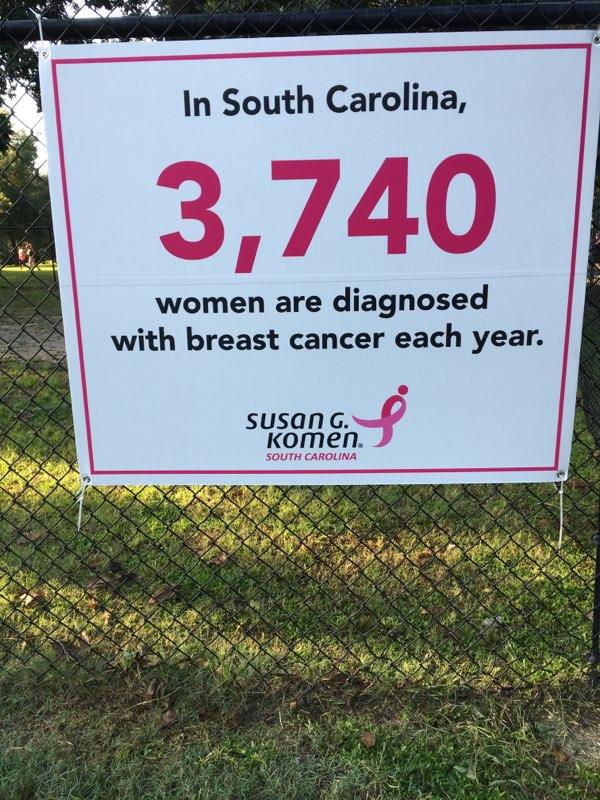
Facts
History
The Race For The Cure was started in 1983 with 800 participants in Dallas, Texas. Over the years the movement has spread globally to more than 1.6 million participants across four continents. This year it is expected that there will be 140 races globally. Although events are unique in each country, however they all share the same goal.
This year, as well as the past 2 years, I have had the honor to participate alongside my family, in the Race For The Cure. Like every year, it is heart filling to be amongst a sea of pink shirts and pink ribbons, gathered together for one cause. Moreover, it is a reminder of the battle that myself and so many other courageous women also fought.
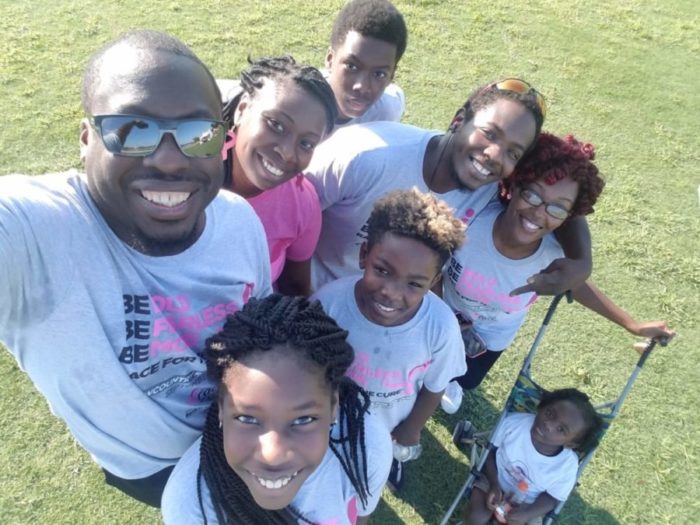
Family Support
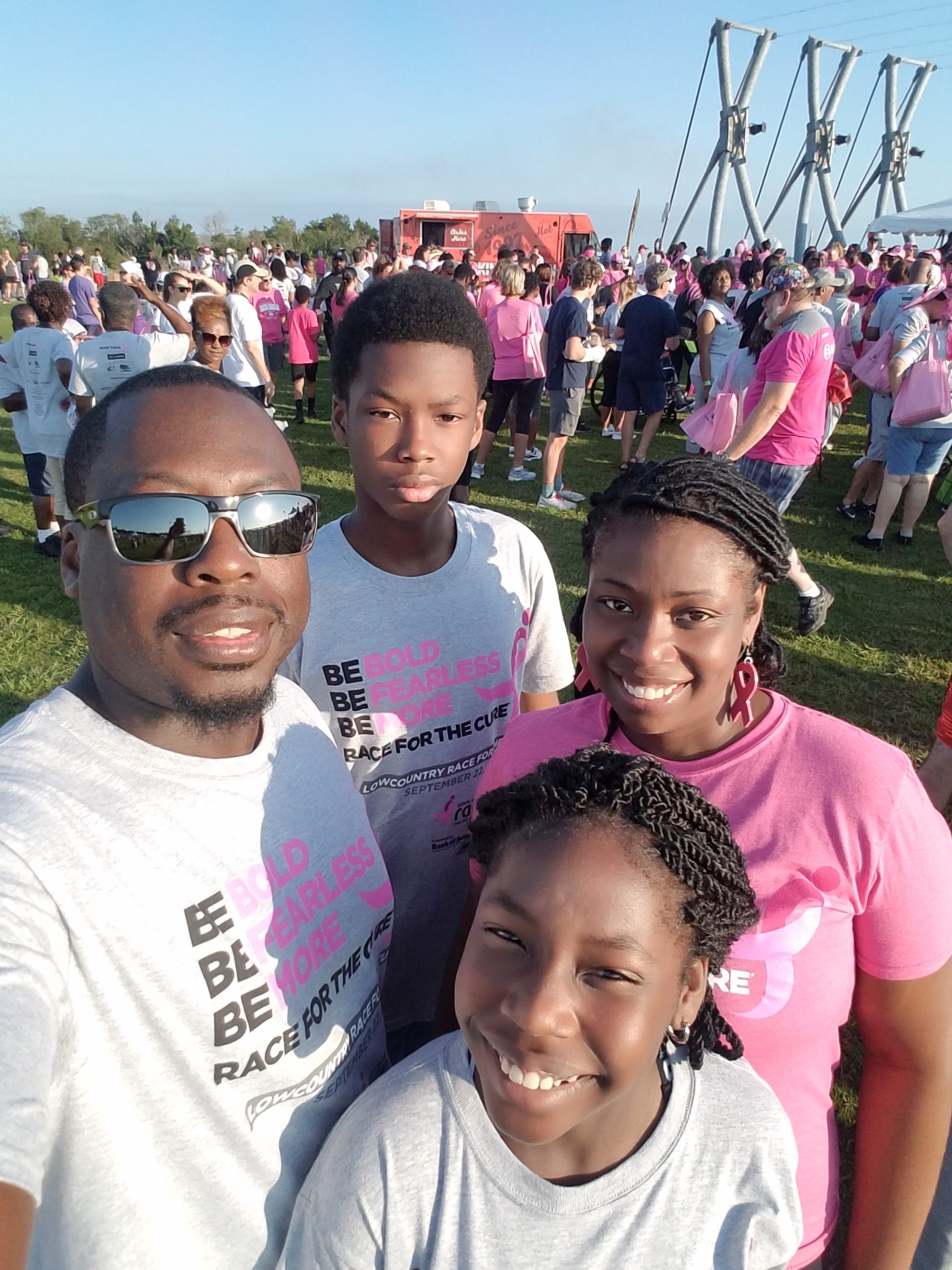
Find a race in a city near you to show your support for breast cancer. Every two minutes a woman is the US is diagnosed with breast cancer. Furthermore remember that one in eight women will be diagnosed with breast cancer in their lifetime. Become educated. Learn about the disease, so that you are aware of your risk factors.
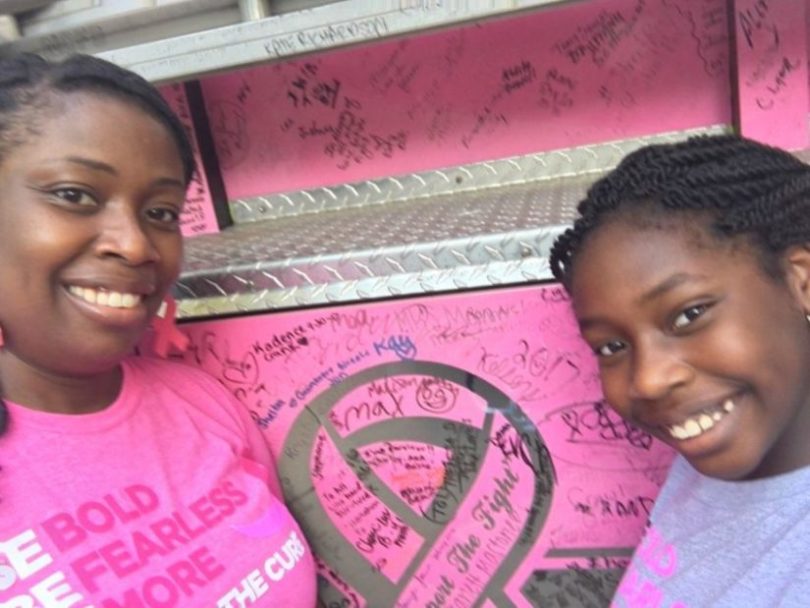
Pink Fire Truck
- Published in breast cancer, breast cancer awareness, Support, Uncategorized
